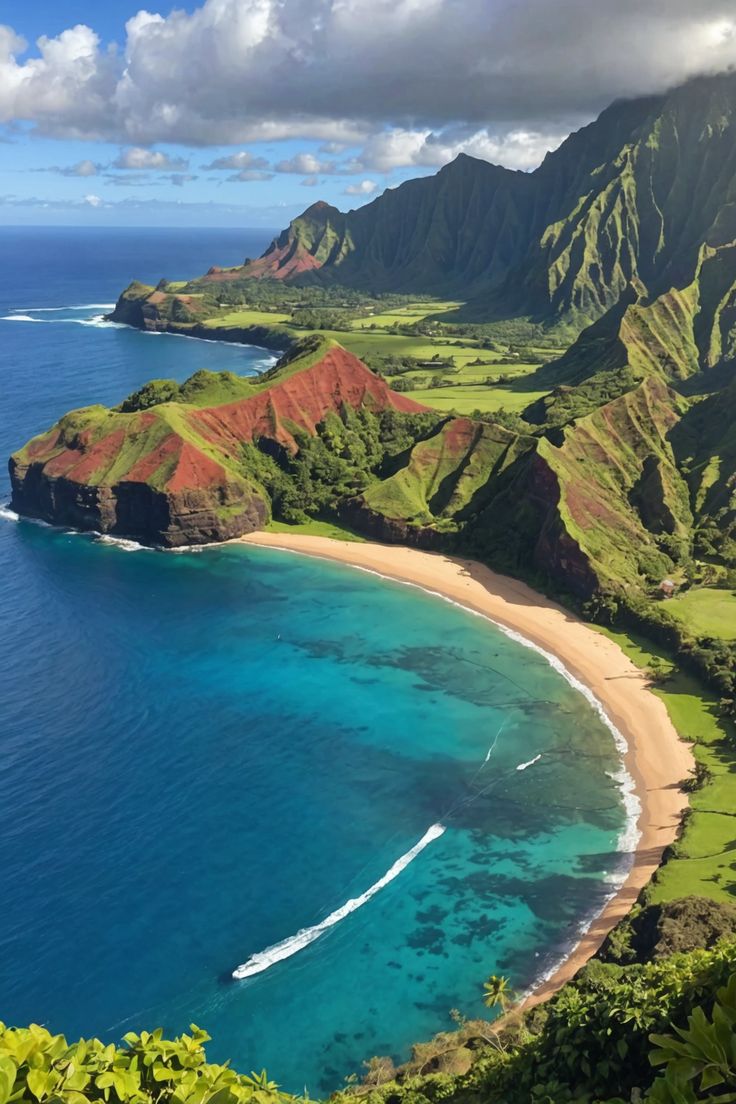Hawaii, USA: 7 Inspiring Reasons Hawaii Will Change Your Life
Hawaii, the 50th state of the United States, is often considered the epitome of paradise. With its breathtaking landscapes, rich cultural heritage, and laid-back lifestyle, Hawaii stands out as one of the most unique and beloved places in the world. From towering volcanoes to pristine beaches, Hawaii is not just a vacation destination; it’s a place that has a profound impact on the lives of its residents and visitors alike. In this article, we will explore the history of Hawaii, its daily life, cultural significance, and why this island state is so important to society today.
A Brief History
The history of the dates back over a thousand years, when the first Polynesians arrived on the islands. These early settlers, guided by their navigational expertise, formed tight-knit communities and developed a rich cultural and spiritual connection to the land. The indigenous Hawaiians (Kanaka Maoli) cultivated crops like taro, sweet potatoes, and coconuts, creating a sustainable way of life.
In 1778, British explorer Captain James Cook arrived in Hawaii, marking the first known contact with Europeans. This event brought about significant changes to the islands, including the introduction of new diseases, Western weapons, and Christianity. Over time, Hawaii transitioned from a collection of independent kingdoms to a U.S. territory in 1898, and eventually became the 50th state in 1959.
It’s transition into statehood was marked by the preservation of its distinct culture and traditions, despite its integration into the United States. Today, Hawaii stands as a symbol of resilience, unity, and cultural pride, with its people maintaining strong ties to their heritage while embracing modern advancements.
Daily Life and Its Impact
Living in it is an experience like no other. The islands’ natural beauty, warm weather, and slower pace of life create a unique environment that deeply influences daily life. Residents, known as “locals,” often embrace the “Aloha Spirit,” a concept that encourages kindness, love, and respect for others. This spirit of hospitality and unity is a core value for Hawaiians and is reflected in their daily interactions and lifestyle.
The pace of life in Hawaii is notably more relaxed than in most other parts of the United States. People take time to appreciate nature, spend time with family, and engage in outdoor activities. Whether it’s hiking through lush rainforests, surfing on world-famous waves, or attending a traditional Hawaiian luau, everyday life revolves around the land, sea, and culture.
One of the key factors that impact daily life in Hawaii is its geography. With the islands’ remote location in the Pacific Ocean, Hawaii has a unique sense of self-sufficiency. Locals often grow their own food, support local businesses, and enjoy a lifestyle that is deeply connected to the earth and ocean. Sustainability and environmental conservation are important aspects of Hawaiian life, with many residents working towards reducing their carbon footprint and preserving the natural beauty of the islands.
The Significance
It holds significant cultural, environmental, and economic importance, both to the United States and the world.
Cultural Significance: The culture is an extraordinary blend of indigenous Hawaiian traditions and influences from other cultures, particularly Polynesian, Asian, and Western. This fusion creates a unique and vibrant society, where traditional practices like hula dancing, luaus, and ukulele music are celebrated alongside modern expressions of art, music, and cuisine. Hawaii is also home to several sacred sites, including the ancient Hawaiian temples (heiau) and the famous Diamond Head crater, all of which are integral to the spiritual life of the islands.
Environmental Significance: It is known for its stunning natural beauty, which includes its diverse ecosystems, breathtaking beaches, tropical rainforests, and active volcanoes. The state is home to several national parks, including Hawai’i Volcanoes National Park, where visitors can witness the power of the Kīlauea volcano. Hawaii is also a hub for biodiversity, with many species of plants and animals found nowhere else on Earth. The state’s commitment to conservation and environmental protection plays a vital role in preserving its unique landscapes and resources.
Economic Significance: The economy is driven primarily by tourism, agriculture, and military presence. The islands attract millions of tourists each year, who come to experience its stunning beaches, rich culture, and outdoor adventures. Tourism plays a critical role in Hawaii’s economy, supporting local businesses, hotels, and restaurants. Additionally, agriculture remains an important industry, with crops like pineapples, sugarcane, and coffee being key exports. Hawaii’s military presence also contributes to its economic stability, with several major military bases located on the islands.
Fun Facts
- Multiple Islands: It consists of eight main islands, along with numerous smaller islands, atolls, and reefs. The eight main islands are Hawai’i (the Big Island), Oahu, Maui, Kauai, Molokai, Lanai, Niihau, and Kahoolawe.
- Unique Wildlife: It is home to many unique species, including the Hawaiian monk seal, green sea turtles, and the endangered Nene goose, which is the state bird.
- Active Volcanoes: It is one of the only places on Earth where you can witness active volcanoes, including Kīlauea, which has been continuously erupting in recent years.
- Hawaiian Language: The language (ʻŌlelo Hawaiʻi) is one of the state’s two official languages, alongside English. Although Hawaiian is not widely spoken today, it holds deep cultural significance and is taught in schools to preserve the language.
- Hawaii’s State Flower: The state flower is the Hibiscus, which comes in a variety of colors, including red, yellow, and white.
FAQs
Q: When is the best time to visit?
A: The best time to visit is during the dry season, from mid-April to October. This period offers the best weather for outdoor activities, beach visits, and hiking.
Q: What is most famous food?
A: One of most famous dishes is poke, a traditional Hawaiian dish made of raw fish marinated in soy sauce, sesame oil, and other seasonings. Other popular foods include loco moco (rice topped with a hamburger patty, fried egg, and gravy) and spam musubi (grilled Spam served on rice with nori).
Q: How can I experience culture?
A: To experience the culture, visitors can attend a luau, watch hula dancing performances, listen to traditional Hawaiian music, and visit cultural centers like the Polynesian Cultural Center on Oahu or the Bishop Museum in Honolulu.
Q: Is safe for tourists?
A: Yes, It is considered a safe destination for tourists. However, like any popular tourist destination, it’s important to take basic safety precautions, such as being mindful of ocean conditions, wildlife, and weather.
Conclusion: A Paradise Like No Other
It is much more than a popular vacation spot; it’s a place that offers a deep sense of connection to nature, culture, and community. Its stunning landscapes, rich cultural traditions, and laid-back lifestyle make it a place that has a lasting impact on anyone who visits. Whether you’re exploring its volcanic craters, experiencing the warmth of the Aloha Spirit, or simply relaxing on one of its pristine beaches, Hawaii leaves a lasting impression that will stay with you long after you leave.
Wishing You an Incredible Journey: The islands’ unique charm, cultural richness, and natural beauty will leave you awe-struck and inspired. There’s no place quite like Hawaii, and it’s sure to change the way you look at the world.











You actually suggested that exceptionally well.
Kudos! I value it!